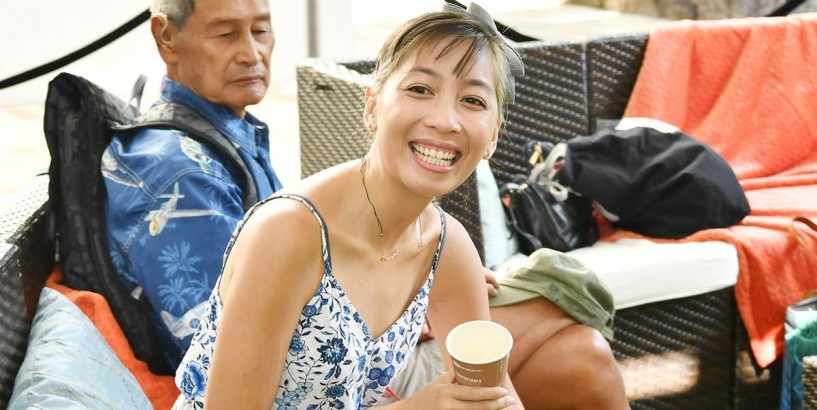U.S. director is one of Laos' first female filmmakers bringing horror to screen Laos had essentially no film industry to speak of, but Mattie Do is diving right in. Mattie Do attends the NETPAC breakfast during the 39th Annual Hawai'i International Film Festival presented by Halekulani in Honolulu, Hawaii on Nov. 14, 2019. Amy Sussman / Getty Images file Breaking News Emails Dec. 11, 2019, 10:11 PM UTC / Updated Dec. 12, 2019, 12:45 AM UTC ByVariety LOS ANGELES — Laos' first and only female filmmaker Mattie Do, whose thriller "The Long Walk" screened in the International Film Festival and Awards Macao's world panorama section, tumbled into her profession with a dose of liquid courage. She'd recently moved to Laos from the U.S. to take care of her father, who'd moved back after her mother passed when she was just 25, leaving him without an anchor in his adopted country. Once in Laos, Do's American screenwriter husband Christopher Larsen, who'd moved with her, discovered that the country had essentially no film industry to speak of. He sleuthed out the company that currently produces her films, who were so excited to meet someone who wanted to make movies in Laos that they hired him on the spot, Do recounts. But Christopher Larsen was no director, and Do had up until that point been a ballerina teaching dance. "My husband was like, 'Mattie, you got this. If you can make a six-year-old dance nonstop on stage, you can do this film thing. They're adults, you can talk to them. You can stop the camera and restart again, and do multiple takes'," she laughed. Larsen told Do's future producers she had "a lot of experience in the performing arts," and that was enough. "We got so drunk on celebration whiskey. They were like, 'We've never had a female film director before in the country - we're rewriting Laos history!' And the drunker I got, the more confident I got that I could be making a film. And then I made a film." "The Long Walk," her third feature, is a time travel horror thriller with ghosts and a serial killer and spaceships that takes place in a rural Laotian village. Do says it was a highly personal and "therapeutic" film for her to make that helped her come to terms with the passing of her mother and a beloved dog. The Morning Rundown Get a head start on the morning's top stories. Sign Up This site is protected by recaptcha Privacy Policy | Terms of Service She envisions the film as a meditation on what we would change in our lives if we had the chance to go back for a do-over and whether we even should, if this were possible, and also how, even in a world with spaceships or microchip implants, people will still be lonely and have their regrets. It's also a commentary, she says, on how development hits Laos unevenly, bringing 4G and smartphones but leaving dirt roads and schools without adequate supplies. "Laos gets left behind and forgotten. For all the new that is thrown at us, there's a lot of old that continues to haunt us," she told Variety. Do, a lifelong horror fan, is drawn to the genre because "it's so much more fun." "I don't feel like I always fit in with the big drama and arthouse groups of people who are sometimes so serious," she said, saying that the genre community has been one of the most supportive she's ever been a part of, which is enough to keep her working in the horror genre "forever." She feels that her outsider status as an American has helped her frame Laotian life and culture in a way that's accessible overseas, while her Laos roots keeps her work from getting "preachy," "condescending" or "white savior-y." "Our ghost stories, our shrines, the way we believe that we exist in a parallel dimension with spirits -- that's something that's so Laos and so Asian, yet that might not seem so unique to Laos people because it's such a part of their everyday lives," she said. "But it's not mundane to the Western world. I can show this to them and they can see something new that they wouldn't normally know about Laos." Only one or two films are made a year in the country. The industry is challenged, of course, by a lack of equipment and infrastructure, and government funding, but Do adds that it's also lagging because people are too prone to copying previous successes. "We have a long way to go before our filmmakers gain the confidence to just do what they want to do without worrying so much about what they think is expected," she said. As an untrained filmmaker herself, "I didn't watch a lot of films, and don't know a lot about classics or famous films that have come before me," she said. "I'm just doing the stories that I find interesting. And it's working." Do currently has two projects in development with Larsen. One is a "really dark Southeast Asian human trafficking film that tackles white privilege and being an other in a country that's not yours and getting entangled in something that is maybe beyond your scope." The other is a "ballet film that is a Lovecraftian cosmic horror film." The latter won't be set in Laos, where ballet doesn't really exist yet, but will explore the story of "someone who's trying to navigate the challenges of an excruciating career like ballet while being a foreigner and not really understanding the culture and the language around them." "I really like films about being excluded and outside. All of these things have formed me into the bastard mutt I am," she explained. Variety
© 2024, Copyrights gulftimes.com. All Rights Reserved









